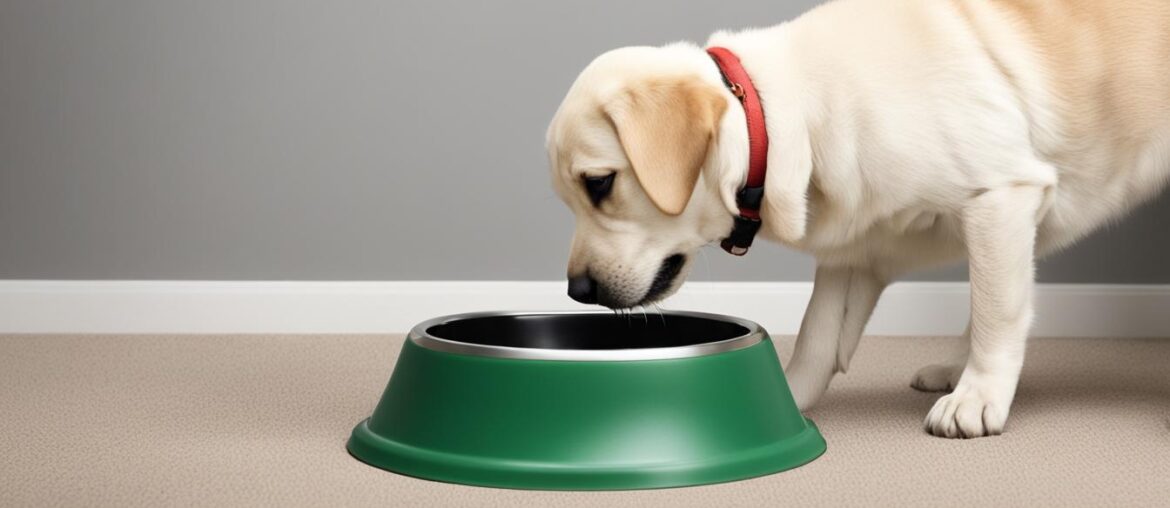When it comes to our furry companions, their nutritional needs vary depending on their age and life stage. Puppy food is specifically formulated to meet the unique dietary requirements of growing puppies. But what about adult dogs? Can they eat puppy food? Let’s explore the implications of feeding puppy food to adult dogs and why it’s important to provide appropriate nutrition for our canine friends.
Key Takeaways:
- Feeding adult dogs puppy food can lead to health concerns as their nutritional needs are different.
- Puppy food is designed to support the growth and development of puppies, with higher levels of nutrients.
- Adult dogs have slower metabolisms and require a different balance of nutrients.
- Consulting with a veterinarian is crucial for determining the appropriate diet for your adult dog.
- Providing a life-stage-appropriate diet ensures optimal nutrition and overall health for adult dogs.
Why are Puppy Diets Different?

Puppy diets are designed to meet the specific nutritional needs of growing puppies. As puppies go through a rapid growth phase, their dietary requirements differ from adult dogs. Scientific research and understanding of dietary needs have contributed to the formulation of specialized puppy diets. These diets focus on providing essential nutritional components that support the development of bones, tissues, and overall growth.
Puppies require higher levels of certain nutrients to support their growth, such as:
- Calcium: Vital for the development of strong bones and teeth.
- Phosphorus: Important for bone formation and cellular metabolism.
- Zinc: Essential for normal growth and immune function.
- Copper: Aids in connective tissue formation and iron absorption.
- Sodium: Supports proper nerve and muscle function.
Extensive scientific research has contributed to identifying these specific nutritional components and formulating puppy diets to ensure optimal health and growth. Recognizing the unique dietary needs of growing puppies is essential for their overall well-being.
Can I Feed My Adult Dog Puppy Food?

Feeding puppy food to adult dogs is not advisable because adult dogs have different nutritional needs and slower metabolisms. Adult dogs require a life-stage-appropriate diet that meets their specific nutritional requirements. Puppy food is formulated to support the growth and development of puppies, which includes higher levels of nutrients such as calcium, phosphorus, zinc, copper, and sodium. These higher nutrient levels are not suitable for adult dogs and can lead to health concerns if fed long-term.
It is important to provide adult dogs with a balanced and complete diet that meets their nutritional needs. The Association of American Feed Control Officials (AAFCO) has established nutrient profiles for different life stages, including adult dogs. These nutrient profiles ensure that the food provides all the essential nutrients in the right proportions.
Consulting with a veterinarian is recommended to determine the appropriate life-stage diet for adult dogs. A veterinarian will consider factors such as the dog’s age, activity level, and overall health to recommend the best food for the dog’s specific needs. They can provide guidance on selecting a commercially available diet that meets AAFCO’s nutrient profiles or offer advice on home-prepared diets that provide the necessary nutrition.
Feeding adult dogs a proper life-stage-appropriate diet ensures that they receive the essential nutrients needed to support their health, energy levels, and overall wellbeing. Providing the right food for adult dogs is an essential aspect of responsible pet ownership.
What Problems May I See Feeding Puppy Food to my Adult Dog?

Feeding puppy food to adult dogs can lead to several problems due to the differences in their nutritional needs and metabolisms. Puppy food is typically more calorically dense than adult dog food, which can contribute to weight gain and obesity in adult dogs.
Obesity in dogs is a serious issue that can increase the risk of various health problems, including joint disease and arthritis. The excess weight puts added stress on the joints, leading to discomfort, reduced mobility, and an increased likelihood of developing joint-related conditions.
In addition, the high protein content in puppy food may not be suitable for adult dogs with kidney issues, such as chronic kidney disease. Excessive protein intake can strain the kidneys and worsen kidney function in dogs with pre-existing kidney issues.
To ensure the overall health and well-being of your adult dog, it is crucial to provide them with a diet appropriate for their life stage and individual needs.
Feeding puppy food to adult dogs can result in weight gain, obesity, joint disease, arthritis, and may worsen kidney issues in dogs with chronic kidney disease.
Comparison of Nutritional Composition
| Aspect | Puppy Food | Adult Dog Food |
|---|---|---|
| Caloric Density | Higher | Lower |
| Protein Content | Higher | Lower |
| Calcium and Phosphorus Levels | Higher | Lower |
The table above highlights the key differences in the nutritional composition of puppy food and adult dog food. These differences underline the importance of providing adult dogs with a diet formulated to meet their specific needs.
When Should I Stop Feeding Puppy Food?
Transitioning from a puppy to an adult diet is an important step in providing appropriate nutrition for your growing dog. While the age at which to stop feeding puppy food may vary, it is generally advisable to make the transition around 12 months of age. However, for larger or giant breed puppies, a longer transition period between 18-24 months of age is often recommended.
Different breeds have different growth rates and nutritional requirements, and it is crucial to consult with a veterinarian to determine the best timing for transitioning to an adult diet. A veterinarian can assess your dog’s overall health, growth, and breed-specific factors to provide personalized guidance.
Regular check-ups with a veterinarian are essential during this transition period to monitor your puppy’s growth, health, and dietary needs. These check-ups allow for adjustments to be made if necessary and ensure that your dog is receiving the appropriate nutrition for their current life stage.
| Breed Size | Ideal Age to Stop Feeding Puppy Food |
|---|---|
| Small to Medium Breeds | Around 12 months |
| Large Breeds | Around 12-18 months |
| Giant Breeds | Around 18-24 months |
Remember, an appropriate transition from puppy food to adult food ensures that your dog receives the necessary nutrients for their continued growth and development. Veterinarian guidance and regular check-ups play a crucial role in providing the optimal diet for your beloved furry friend.
What About Diets For All Life Stages?

Diets formulated for all life stages may not be optimal for adult dogs, as they have different nutritional requirements than puppies. While all-life-stage diets provide the minimum nutritional requirements for any given life stage, they may not be tailored to meet the specific needs of adult dogs. A tailored nutritional approach is essential to ensure your dog’s health and well-being throughout its life.
Stage-of-life specific diets are designed to provide the precise nutrients that dogs require at each life stage. These diets take into consideration the unique nutritional requirements of puppies, adult dogs, and senior dogs, ensuring they receive the right balance of proteins, carbohydrates, fats, vitamins, and minerals.
When selecting a diet for your dog, consulting with a veterinary care provider is highly recommended. A veterinarian can assess your dog’s health, age, size, and specific nutritional needs to recommend an appropriate diet. They can also provide guidance on portion sizes and feeding schedules to ensure your dog receives proper nutrition.
In addition to tailored diets, it’s crucial to consider other factors that may affect your dog’s nutritional requirements. For example, certain breeds may have breed-specific nutritional needs, while dogs with specific health conditions may require specialized diets. By working closely with a veterinary care provider, you can ensure that your dog receives the best possible nutrition for its individual needs.
Final Thoughts

Nutrition plays a crucial role in the overall health and wellbeing of your dog, whether it is a growing puppy or an adult. Providing a stage-of-life specific diet that meets AAFCO’s standards for a complete balanced diet is essential for maintaining optimal health.
When it comes to nutrition, it is important to understand that the dietary needs of puppies and adult dogs differ. Puppies require specific nutrients in higher quantities to support their growth and development, while adult dogs have different nutritional needs based on their age, activity level, and overall health.
Feeding your dog a stage-of-life specific diet ensures they are receiving the appropriate nutrition to support their specific needs. These diets are formulated to provide the right balance of nutrients, vitamins, and minerals to promote healthy growth, maintain muscle mass, support joint health, and provide energy.
The Association of American Feed Control Officials (AAFCO) has established standards for pet food nutrition, ensuring that these foods contain the necessary nutrients to meet the needs of your dog at each life stage. Look for products that meet AAFCO’s standards to ensure your dog is receiving a complete and balanced diet.
While providing the right nutrition is important, it is also essential to consult with a veterinary care provider to ensure you are making the best choices for your dog’s health. A veterinary care provider can assess your dog’s specific needs, provide guidance on choosing the right stage-of-life specific diet, and address any concerns or questions you may have.
In conclusion, nutrition is a key factor in maintaining your dog’s health throughout their life. By providing a stage-of-life specific diet that meets AAFCO’s standards for a complete balanced diet, you can ensure your dog receives the appropriate nutrition for their current life stage. Consulting with a veterinary care provider will help you make informed decisions and optimize your dog’s health and wellbeing.
Puppies Can’t Eat Adult Dog Food

Puppies have unique nutritional needs that differ from adult dogs. During their growth stage, puppies require higher amounts of essential nutrients such as vitamins and minerals to support healthy muscle and bone development. Feeding them adult dog food can lead to nutrient deficiencies, which can have detrimental effects on their health and well-being.
Puppies rely on a balanced diet to provide the necessary nutrients for growth and development. The right combination of vitamins and minerals aids in the formation of strong bones, healthy teeth, and robust muscles. These nutrients play a crucial role in supporting their overall physical and cognitive development.
When puppies are fed adult dog food, they may not receive adequate amounts of these vital nutrients. This can lead to various health problems, including:
Secondary Nutritional Hyperparathyroidism: Puppies deprived of essential nutrients like calcium and phosphorus may develop this condition, which affects bone and muscle development.
Rickets: A deficiency in vitamin D and calcium can cause rickets, which is characterized by weakened bones and potential skeletal deformities.
Obesity: Adult dog food may contain higher calorie content than what is appropriate for puppies. Overfeeding them can lead to excessive weight gain and obesity.
To ensure the healthy growth and development of puppies, it is essential to provide them with a specially formulated puppy food that meets their specific nutritional needs. Puppy food is designed to provide the right balance of nutrients required for optimal growth and supports their overall health.
Here is a table showcasing the essential nutrients and their role in a puppy’s development:
| Nutrient | Role in Puppy’s Development |
|---|---|
| Vitamins | Supports overall immune system function and healthy growth. |
| Minerals | Aids in the development of strong bones and teeth. |
| Protein | Essential for muscle development and tissue repair. |
| Fats | Provides energy and aids in the development of the nervous system. |
| Calcium and Phosphorus | Vital for proper bone and teeth development. |
It is crucial to provide puppies with a balanced diet that fulfills their unique nutritional needs. This lays the foundation for a healthy and active life. Consulting with a veterinarian can help ensure that your puppy’s nutritional needs are being met and that they are consuming a diet appropriate for their age and development.
Can Senior Dogs Eat Puppy Food
In some cases, a veterinarian may recommend higher calorie puppy food for senior dogs who are underweight or have specific nutritional needs. However, in most cases, it is best to feed senior dogs a diet formulated for adult maintenance or a senior dog food that provides specialized nutrition to support their aging bodies, including maintaining lean muscle mass and promoting joint health and mobility.
| Benefits of Senior Dog Food | Nutritional Components | Scientific Research |
|---|---|---|
| Supports lean muscle mass | Protein | Research has shown that a higher protein diet can help preserve muscle mass in older dogs. |
| Promotes joint health | Glucosamine, chondroitin, omega-3 fatty acids | These ingredients are known to support joint health in senior dogs. |
| Improves mobility | Omega-3 fatty acids, antioxidants | Research suggests that omega-3 fatty acids and antioxidants can help reduce inflammation and improve mobility in senior dogs. |
| Supports cognitive function | Antioxidants, omega-3 fatty acids | Studies have shown that certain nutrients can help support cognitive function in senior dogs. |
Choosing the Right Senior Dog Food
When selecting a senior dog food, look for options that are specifically formulated for the nutritional needs of older dogs. These diets often contain ingredients that support joint health, cognitive function, and overall vitality. It is also important to consider your dog’s individual needs and consult with a veterinarian to determine the best diet for your senior dog.
How to Avoid Adult Dogs Eating Puppy Food
In multi-dog households, it’s essential to ensure that each adult dog receives the appropriate nutrition without consuming puppy food. Here are some strategies to prevent adult dogs from eating puppy food:
- Separate Bowls: Provide each dog with their own designated bowl for meals. This helps prevent any confusion or competition between dogs and ensures that each dog receives their specific food.
- Mealtime Separation: If necessary, feed the dogs in separate rooms or use dog gates to create individual feeding spaces. This helps to create a calm and controlled environment during mealtime and prevents adult dogs from reaching the puppy food.
- Pick Up Bowls: After each meal, promptly pick up the bowls to avoid any lingering smells or temptations for the adult dogs. This reinforces the idea that the puppy food is not accessible to them.
- Regular Feeding Schedule: Establishing a consistent and regular feeding schedule for each dog helps to prevent adult dogs from seeking alternative food sources. By feeding them at set times, they become accustomed to their own meals and are less likely to be interested in the puppy food.
By implementing these strategies, you can ensure that each dog in your multi-dog household receives the appropriate nutrition without adult dogs consuming puppy food.
Feed the Right Food for the Right Life Stage
Proper nutrition is essential for dogs at every stage of life. By feeding the right food that meets their specific needs, you can ensure your furry friend enjoys a long and healthy life. Understanding the nutritional requirements for each life stage will help you make informed choices about what to feed your dog.
Puppy Food for Healthy Growth:
During the puppy stage, dogs experience rapid growth and development. Puppy food is specially formulated to provide the necessary nutrients for their growing bodies. It contains higher levels of calcium, phosphorus, zinc, copper, and sodium to support bone development, muscle growth, and overall health.
Adult Dog Food for Maintenance:
Once your dog reaches adulthood, their nutritional needs change. Adult dog food is designed to maintain optimal body condition and provide the necessary nutrients for daily maintenance. It contains a balanced ratio of proteins, fats, carbohydrates, vitamins, and minerals to support overall health and wellbeing.
Senior Dog Food for Aging Dogs:
As dogs enter their senior years, their metabolism slows down, and their nutritional requirements change. Senior dog food is formulated to meet their specific needs, such as maintaining lean muscle mass, promoting joint health, and supporting their overall aging bodies.
To give you a better understanding of the nutritional differences between puppy, adult, and senior dog food, here is a comparison table:
| Life Stage | Special Nutritional Considerations | Recommended Food |
|---|---|---|
| Puppy | Supports growth, bone development, and muscle growth | Puppy food with higher levels of calcium, phosphorus, zinc, copper, and sodium |
| Adult | Maintains optimal body condition and overall health | Adult dog food with a balanced ratio of proteins, fats, carbohydrates, vitamins, and minerals |
| Senior | Supports aging bodies, promotes joint health, and maintains lean muscle mass | Senior dog food formulated for senior dogs’ specific needs |
Remember, choosing the right food for each life stage is crucial for ensuring your dog’s long and healthy life. Consult with your veterinarian to determine the most suitable food for your furry friend based on their specific needs.
Wrapping Up
Feeding puppy food to adult dogs can have negative consequences for their health and wellbeing. Adult dogs have different nutritional needs compared to growing puppies, and their metabolisms are slower. It is crucial to provide appropriate nutrition for each life stage, including transitioning from puppy food to adult dog food.
Optimal nutrition plays a vital role in supporting the overall health of adult dogs. Feeding them a diet formulated specifically for their life stage ensures they receive the right balance of nutrients. Consulting with a veterinarian can provide valuable guidance on the best diet for your adult dog.
Remember, when it comes to the nutritional needs of your furry friend, one size does not fit all. Providing adult dogs with the right diet tailored to their specific needs helps promote their long-term health and wellbeing. By prioritizing optimal nutrition for your adult dog, you can ensure they live a happy and healthy life.
FAQ
Can Adult Dogs Eat Puppy Food?
Feeding puppy food to adult dogs is not advisable because adult dogs have different nutritional needs and slower metabolisms. It is recommended to feed adult dogs a life-stage-appropriate diet that meets AAFCO’s nutrient profiles for a complete and balanced diet. If unsure about the appropriateness of the food provided to the dog, consulting with a veterinarian is recommended.
Why are Puppy Diets Different?
Puppy diets are different because growing puppies have higher requirements for certain nutrients like calcium, phosphorus, zinc, copper, and sodium. These nutrients are important for the growth of bones and tissues. Scientific research has gone into formulating puppy diets to ensure they meet the specific dietary needs of growing puppies. Home-preparing diets for growing puppies can be challenging, and it is advisable to seek advice from a licensed veterinary nutritionist.
Can I Feed My Adult Dog Puppy Food?
Feeding puppy food to adult dogs can lead to health concerns as their nutritional needs are different, and their metabolisms are slower. It is recommended to feed adult dogs a life-stage-appropriate diet that meets AAFCO’s nutrient profiles for a complete and balanced diet. If unsure about the appropriateness of the food provided to the dog, consulting with a veterinarian is recommended.
What Problems May I See Feeding Puppy Food to my Adult Dog?
Feeding puppy food to adult dogs, which is usually more calorically dense than adult food, can lead to weight gain and obesity. Obesity in dogs is linked to various health issues, including arthritis and joint disease. Additionally, the high protein content in puppy food may not be suitable for dogs with kidney issues, as it can put a strain on the kidneys and worsen chronic kidney disease.
When Should I Stop Feeding Puppy Food?
It is generally advisable to transition puppies onto an adult diet around 12 months of age. However, for larger or giant breed puppies, a transition is usually recommended between 18-24 months of age. The timing may vary depending on the breed, so consulting with a veterinarian is recommended to determine the appropriate age for transitioning to an adult diet.
What About Diets For All Life Stages?
Diets formulated for all life stages may not be optimal for adult dogs, as they have different nutritional requirements than puppies. All-life-stage diets provide the minimum nutritional requirements for any given life stage, but may not be tailored to meet the specific needs of adult dogs. For a more tailored nutritional approach, it is recommended to look for stage-of-life specific diets. Consulting with a veterinary care provider can provide guidance on the right diet for your puppy or adult dog.
Final Thoughts
Nutrition plays a crucial role in the health of your dog, whether it is a growing puppy or an adult. It is important to provide a stage-of-life specific diet that meets AAFCO’s standards for a complete balanced diet. If unsure about the appropriateness of the food provided, consulting with a veterinary care provider is recommended to ensure optimal nutrition for your dog’s health and wellbeing.
Puppies Can’t Eat Adult Dog Food
Puppies have unique nutritional needs compared to adult dogs. They require higher amounts of nutrients such as vitamins and minerals for healthy growth, muscle, and bone development. Feeding adult dog food to puppies may result in nutrient deficiencies, leading to health problems like secondary nutritional hyperparathyroidism, rickets, and obesity.
Can Senior Dogs Eat Puppy Food?
In some cases, a veterinarian may recommend higher calorie puppy food for senior dogs who are underweight or have specific nutritional needs. However, in most cases, it is best to feed senior dogs a diet formulated for adult maintenance or a senior dog food that provides specialized nutrition to support their aging bodies, including maintaining lean muscle mass and promoting joint health and mobility.
How to Avoid Adult Dogs Eating Puppy Food
To prevent adult dogs from eating puppy food, it is recommended to give each dog their own space for meals, such as separate rooms or using dog gates to keep them separated. Picking up bowls between meals and establishing a regular feeding schedule can also help ensure that each dog consumes their appropriate food without intrusion.
Feed the Right Food for the Right Life Stage
It is important to feed the right food for the right life stage of your dog. Puppy food is formulated to support healthy growth, while adult dog food is formulated to maintain optimal overall body condition and health. Senior dog food provides specialized nutrition for aging dogs. Choosing the appropriate food for each life stage is essential for ensuring long and healthy lives for our dogs.






